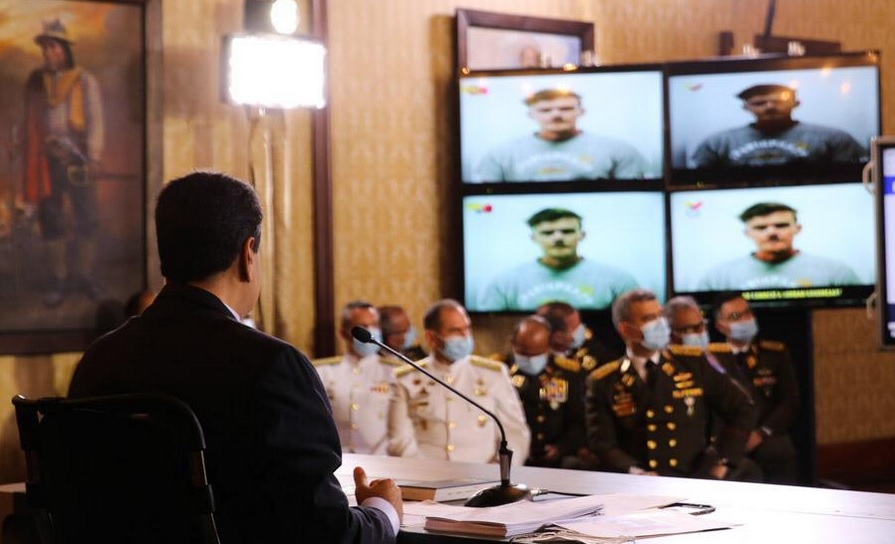RIO DE JANEIRO, BRAZIL – The Venezuelan authorities have released interrogation videos of a participant in the failed May 3rd mercenary incursion, which are intended to underpin a link between the US administration and the company.

In parallel, Communications Minister Jorge Rodríguez reiterated accusations of collusion with the Colombian government. The statements of Antonio Sequea, currently in custody, whom investigators call the mission’s “operational head”, were the focus of yet another press conference by the Minister.
Sequea said under questioning that Jordan Goudreau, the head of the US security firm Silvercorp, had made contact with him in mid-March and announced that he had met the Venezuelan opposition politician Juan Guaidó at the White House and had been confirmed as head of the paramilitary operation against Venezuela.
Goudreau conveyed a sense of security and protection to the people in Colombia, concentrated in several paramilitary camps, by implying that the US President was aware of the planned operation.
The head of Silvercorp told them “a week before” that the US Navy would be deployed in the Caribbean and the Eastern Pacific to formally prevent drug smuggling in the midst of the coronavirus pandemic.
“Everything was carried out exactly as he described it. That made us feel protected,” Sequea said.
Goudreau also pointed out that the planned operation was legally guaranteed because he had signed a contract with Guaidó, who was recognized by the US government as the legitimate president of Venezuela.
This contract has only recently been made public. Among other publications, the Washington Post has published a detailed report on the subject.
With regard to Colombia’s involvement in the mercenary operation, which Iván Duque’s government has firmly denied, Venezuela’s Minister of Communications stated that his authorities provided all the data and coordinates of the paramilitary camps in the neighboring country where the operation was being prepared. Therefore, he said, the declared unawareness was implausible.
In Colombia, there are indications of US involvement, through evidence leading to its anti-drug agency DEA. According to Sequea, he and his men were surprised to see a DEA base in the area on their way from their military camps to the Venezuelan border. Drug lords known to the locals seemed to be active in the region.
Referring to this account, Rodríguez accused the DEA and the Duque government of hypocrisy. The main cocaine-producing and consuming countries pointed the finger at Venezuela, the Minister said, alluding to US accusations against President Nicolás Maduro of drug trafficking.
Rodriguez explained that it is common practice for the DEA to recruit drug dealers to use them against Venezuela. In Washington, there are also voices expressing doubts that the Trump government knew nothing about the company.
The US Congress Foreign Affairs Committee asked the State Department on May 5th for “immediate disclosure” of the events, but has not yet received any explanations. After all, two US citizens are now also accused of terrorism in the affair. Secretary of State Mike Pompeo had merely stated that the USA had no “direct involvement” in the operation.
They did not “direct”, “lead” or “manage” the failed attempt, said the committee’s chairman, the Democrat Eliot Engel. However, he is expecting details of what happened. Venezuela’s communications Minister welcomed the fact that the Foreign Affairs Committee has sought clarification on the role of the Trump government.
He also suggested that the committee should interrogate Iván Simonovis, “Guaidó’s Special Commissioner for Security and Intelligence”, who is currently in the US, to determine whether it is true that the US government was aware of the actions against Venezuela.
Meanwhile, two key Guaidó officials, Juan José Rendón and Sergio Vergara, have resigned from their positions.
Rendón was considered the “head of the strategic committee of the interim government of Juan Guaidó” and was allegedly at the heart of the affair, given his role in drafting and signing the contract with the US military contractor Silvercorp, which contains detailed instructions for the forced removal of the Maduro government.
Unlike Guaidó, Rendón admitted to having signed the contract. He provided the media with explanations on damage control and tried to provide a version given the many contradictions in which Guaidó became entangled.
Rendón stated that he had signed the contract but that the plan was not implemented, because of his distrust of Silvercorp’s owner, Goudreau. However, he was unable to explain why Guaidó’s signature is also on the contract and why there is an audio recording of the signing of the contract where both Guaidó and Goudreau can be heard.

